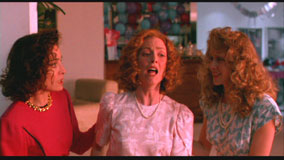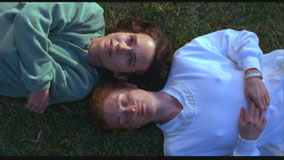|
Newest Reviews:
New Movies -
The Tunnel
V/H/S
The Tall Man
Mama Africa
Detention
Brake
Ted
Tomboy
Brownian Movement
Last Ride
[Rec]³: Genesis
Hara-Kiri: Death of a Samurai
Indie Game: The Movie
Abraham Lincoln: Vampire Hunter
Old Movies -
Touki Bouki: The Journey of the Hyena
Drums Along the Mohawk
The Chase
The Heiress
Show
People
The Strange Affair of Uncle Harry
Pitfall
Driftwood
Miracle Mile
The Great Flamarion
Dark Habits
Archives -
Recap: 2000,
2001, 2002,
2003, 2004
, 2005, 2006,
2007 , 2008
, 2009 ,
2010 , 2011 ,
2012
All reviews alphabetically
All reviews by star rating
All reviews by release year
Masterpieces
Screening Log
Links
FAQ
E-mail me
HOME
| |
Safe
(Todd Haynes) 1995
 Todd
Haynes’ suburban melodrama Safe is a
movie that’s so ambivalently torn between mocking its subject and looking at
her with complete conviction that it becomes exhilarating. There’s a moment
midway through, where when listening to a self-help tape that describes the
“environmental illness” that housewife Carol White (an amazing Julianne
Moore) may or may not have, she’s asked, “What is your total load?”
Whether Carol’s infirmity is indeed a “total load” or a legitimately
misunderstood malady seems like a straightforward question, but Haynes doesn’t
ever make the decision easy for us. He often shoots Carol as a tiny figure
that’s dominated by her environment, and in a few shots, he plays with light
or the soundtrack (turning up a nearly imperceptible drone until it becomes
unmistakable) to further suggest its impact on her. You get the sense that the almost invisible Carol
first feels unique upon becoming ill, so she plays it for all it’s worth. It
gives her something to do besides pick out a new couch for her home, but
eventually she realizes that she doesn’t need to feel special, since she
doesn’t have anything special to say, but since she’s already sick (or
convinced that she is) and can’t resume her old life, she needs to retreat to
find others who are like her, so she can once again gain some anonymity.
It’s impossible for
the audience to take her existence entirely seriously. Filled with bubble-gum
pop music and trendy fad diets, strip malls and health spas, her world is such a
disposable and transient one that it’s difficult to imagine anything
persisting in it long enough to stir up any sort of allergic reaction. The movie
maintains its steady gaze at Carol, but the audience’s perception of her
condition is continually shifting. Safe moves
from being a chronicle of a vapid life, to a potent AIDS metaphor, to an
observation of psychosomatic insanity, to a stinging satire about the state of
Southern California in 1988, to a frightening examination of the unknown.
Todd
Haynes’ suburban melodrama Safe is a
movie that’s so ambivalently torn between mocking its subject and looking at
her with complete conviction that it becomes exhilarating. There’s a moment
midway through, where when listening to a self-help tape that describes the
“environmental illness” that housewife Carol White (an amazing Julianne
Moore) may or may not have, she’s asked, “What is your total load?”
Whether Carol’s infirmity is indeed a “total load” or a legitimately
misunderstood malady seems like a straightforward question, but Haynes doesn’t
ever make the decision easy for us. He often shoots Carol as a tiny figure
that’s dominated by her environment, and in a few shots, he plays with light
or the soundtrack (turning up a nearly imperceptible drone until it becomes
unmistakable) to further suggest its impact on her. You get the sense that the almost invisible Carol
first feels unique upon becoming ill, so she plays it for all it’s worth. It
gives her something to do besides pick out a new couch for her home, but
eventually she realizes that she doesn’t need to feel special, since she
doesn’t have anything special to say, but since she’s already sick (or
convinced that she is) and can’t resume her old life, she needs to retreat to
find others who are like her, so she can once again gain some anonymity.
It’s impossible for
the audience to take her existence entirely seriously. Filled with bubble-gum
pop music and trendy fad diets, strip malls and health spas, her world is such a
disposable and transient one that it’s difficult to imagine anything
persisting in it long enough to stir up any sort of allergic reaction. The movie
maintains its steady gaze at Carol, but the audience’s perception of her
condition is continually shifting. Safe moves
from being a chronicle of a vapid life, to a potent AIDS metaphor, to an
observation of psychosomatic insanity, to a stinging satire about the state of
Southern California in 1988, to a frightening examination of the unknown.
 Midway
through the film, Carol heads off to the fictional Wrenwood Center, where she
seeks treatment for her disease (which apparently has affected many others).
Clearly, much of the dogma that’s preached there sounds like bunk, but
there’s no denying that it has a positive effect on the patients that hear it.
Initially, Carol is tentative about engaging in the Wrenwood community, and her
caution matches the audience’s as we struggle to get our bearings in this new
environ. As she stays there, however, she begins to receive the affirmation that
she lacked at home, which seems to curb many of her physical problems, but also
seems to send her further into her dependency on her disease. It’s impossible
not to notice that as claustrophobic as her Californian home felt, her Wrenwood
residences grow increasingly tiny as she stays there. Nothing in the movie ever
explicitly states this, but the suggestion seems to be that if she’s not sick,
Carol doesn’t feel special in any way. I’ve seen the film several times, and
the most likely explanation for her illness seems to be that it has some degree
of physical validity, but Carol’s psychological needs have blown it out of
proportion until she’s reached a point where she can’t tell the difference.
I imagine, though, that every viewer will have a different interpretation the
illness. I certainly feel differently about it with every viewing. In any
case, what’s real beyond a shadow of a doubt is Carol’s stress. She
is convinced that she’s sick, and because Julianne Moore inhabits her
character to such a large degree, we sympathize with her even if we can’t
agree with her. Her act of searching for a cure for whatever it is that ails her
is far more important than whether or not what the Wrenwood clinic is selling
her is legitimate. Safe succeeds
brilliantly because it takes what feels like a television movie-of-the-week’s
premise and infuses it with enough intelligence and ambiguity that it becomes a
stunning examination of its protagonist. The audience feels pity for her poor,
frustrated husband, since he’s the closest thing that the film provides to a
surrogate for them, but whenever we sympathize with his anger at his wife, we
later feel remorse like he does because a chilling notion occurs to us:
Carol’s predicament might be real.
Midway
through the film, Carol heads off to the fictional Wrenwood Center, where she
seeks treatment for her disease (which apparently has affected many others).
Clearly, much of the dogma that’s preached there sounds like bunk, but
there’s no denying that it has a positive effect on the patients that hear it.
Initially, Carol is tentative about engaging in the Wrenwood community, and her
caution matches the audience’s as we struggle to get our bearings in this new
environ. As she stays there, however, she begins to receive the affirmation that
she lacked at home, which seems to curb many of her physical problems, but also
seems to send her further into her dependency on her disease. It’s impossible
not to notice that as claustrophobic as her Californian home felt, her Wrenwood
residences grow increasingly tiny as she stays there. Nothing in the movie ever
explicitly states this, but the suggestion seems to be that if she’s not sick,
Carol doesn’t feel special in any way. I’ve seen the film several times, and
the most likely explanation for her illness seems to be that it has some degree
of physical validity, but Carol’s psychological needs have blown it out of
proportion until she’s reached a point where she can’t tell the difference.
I imagine, though, that every viewer will have a different interpretation the
illness. I certainly feel differently about it with every viewing. In any
case, what’s real beyond a shadow of a doubt is Carol’s stress. She
is convinced that she’s sick, and because Julianne Moore inhabits her
character to such a large degree, we sympathize with her even if we can’t
agree with her. Her act of searching for a cure for whatever it is that ails her
is far more important than whether or not what the Wrenwood clinic is selling
her is legitimate. Safe succeeds
brilliantly because it takes what feels like a television movie-of-the-week’s
premise and infuses it with enough intelligence and ambiguity that it becomes a
stunning examination of its protagonist. The audience feels pity for her poor,
frustrated husband, since he’s the closest thing that the film provides to a
surrogate for them, but whenever we sympathize with his anger at his wife, we
later feel remorse like he does because a chilling notion occurs to us:
Carol’s predicament might be real.
*
* * * Masterpiece
08-08-02
Jeremy
Heilman
|